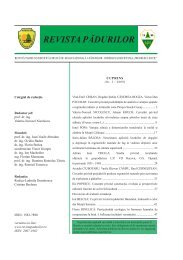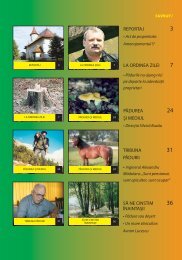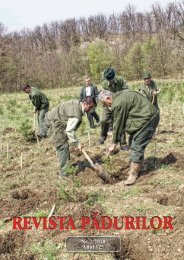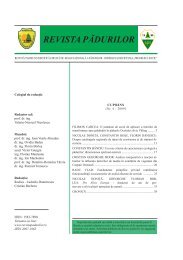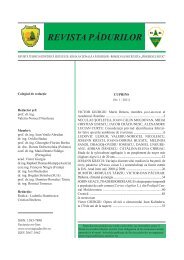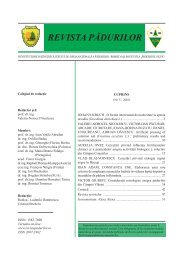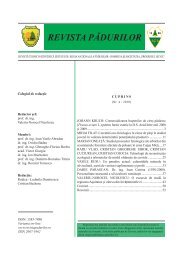şi prof.dr. W. Zwölfer - Revista Pădurilor
şi prof.dr. W. Zwölfer - Revista Pădurilor
şi prof.dr. W. Zwölfer - Revista Pădurilor
Create successful ePaper yourself
Turn your PDF publications into a flip-book with our unique Google optimized e-Paper software.
an issue with important implications in the Romanian forestry: when should halt the application of<br />
thinning?<br />
Abstract<br />
One of the most important decision to make in the silviculture field, with tremendous effects on both efficiency<br />
of wood production and preparation of old stands for natural regeneration by seed, is the moment (age) when thinning<br />
should halt.<br />
In some of the most representative European countries (e.g., France, Germany, Belgium, etc.), since the onset of<br />
Silviculture as a science (mid XIXth century), this moment has been considered as being 10-15 (seldom 20) years<br />
prior to the rotation age.<br />
In Romania, the same approach was used until the beginning of 1970’s when the halt of thinning was considered<br />
as being necessary earlier in the stand’s life. Consequently, according to the last two editions (1986 and 2000) of<br />
the Romanian technical norms on tending operations, thinning should halt when the stand age is maximum 75-80<br />
years (stands designated to sawnwood production) or 100-120 years (veneer logs as target wood assortment).<br />
Taking into account these differences as well as the influences of the moment when thinning should halt on total<br />
wood production as well as timing and quality of natural regeneration, the paper proposes the “re-import” of the<br />
long-time used European approach in Romania and halt of thinning only 10-15 years before the rotation age of forest<br />
stands regardless the function they are due to play.<br />
Keywords: thinning, silvicultural systems, history, Europe, Romania<br />
48 REVISTA PĂDURILOR • Anul 126 • 2011 • Nr. 2



